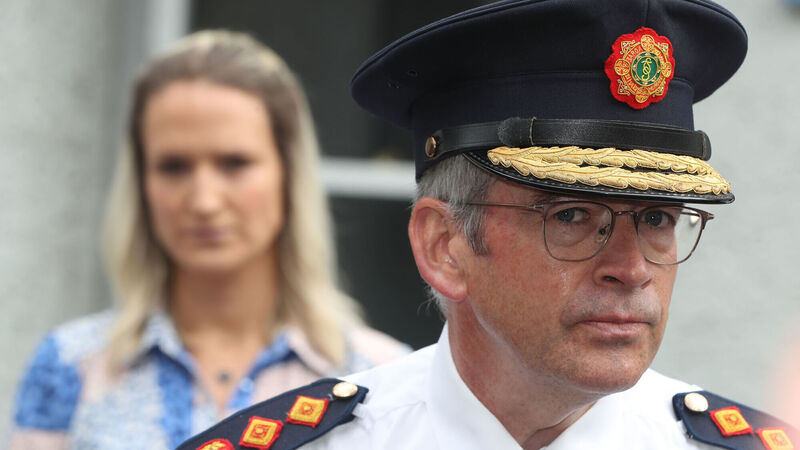Michael Clifford: Garda commissioner presents under-fire Government with handy missile

Why did the commissioner of An Garda Síochána hand the government a missile to fire off at Phil Hogan? Why was Phil Hogan cautioned in Kildare over using a mobile phone while driving?
These questions concern the old chestnut of the interaction between policing and politics and require answers, preferably in an official forum.
The incident in Co Kildare in which Mr Hogan received a caution over a mobile phone is central to the government calling for his resignation.
Taoiseach Micheál Martin told Claire Byrne on RTÉ Radio that news of the incident prompted he and Leo Varadkar to ask Mr Hogan to “consider his position” on Sunday.
Mr Martin said that the incident recording Mr Hogan’s presence in Kildare was in conflict with earlier statements the EU commissioner had given.
Mr Hogan’s spokesman has stated that he “stopped off briefly in Co Kildare on August 17 en route from Kilkenny to Galway. He was stopped by a Garda for using his mobile phone while driving.
“He stopped briefly at his apartment to collect personal belongings and essential documents relating to the EU-US trade negotiations, which continued while the (EU) commissioner was in Galway.”
Mr Hogan reportedly received a caution from the garda and no more. Co Kildare was then and remains in a state of partial lockdown which permits only essential travel.
Mr Hogan’s interaction with the gardaí was a private matter.
Yet the detail found its way to the office of the Garda Commissioner, Drew Harris, who then passed it onto the Minister for Justice Helen McEntee – or the secretary of the department. Ms McEntee informed the Taoiseach and Tánaiste.
There is provision for the garda commissioner to pass information about an individual onto political masters in certain circumstances.
Under Section 41 of the Garda Siochana Act 2005, this can be done for reasons including security of the state, public confidence in the gardaí, accountability to the Oireachtas and a few others. The final part of the section allows for “any other matters that in the commissioner’s opinion, should be brought to the minister’s attention".
Quite obviously, Commissioner Harris felt this matter should. But why?
Phil Hogan is not accountable to the Oireachtas, nor is he a threat to the security of the state. The golfing event he attended is now the focus of a garda investigation. Arguably, the incident in Kildare should form part of that investigation rather than be handed as a nugget to a government that is under severe pressure.
In passing on this information to the government – rather than investigating officers - Mr Harris effectively handed them a political weapon.
The Taoiseach and Tánaiste were now in a position to use that information to deflect anger from their government towards Mr Hogan.
No doubt that wasn’t Commissioner Harris’s intention, but his actions do give rise to the question as to whether he exercised proper judgment in doing so.
A similar situation arose in 2013 when Minister for Justice Alan Shatter was told by commissioner Martin Callinan about an innocuous incident involving TD Mick Wallace. Mr Shatter revealed this live on television during a debate with Mr Wallace about penalty points offences.
Mr Shatter said he had received the information under the relevant act, but Mr Wallace interpreted it as politicising private information.
Mr Shatter later apologised, telling the Dáil:
The fall-out from this week’s Golfgate saga is of a different order to the events of 2013, but the same questions arise about confidential information being put into the public domain for political purposes.
The incident with the mobile phone also gives rise to a number of separate questions. Gardai sometimes do issue cautions rather than proceeding to a fixed charge notice for road traffic offences. Usually, such a decision is informed by mitigating factors.
What were the mitigating factors in Mr Hogan’s case? Did he tell him he was on an urgent call to save the country before we entered the home straight towards a no-deal Brexit? Or did the gardaí on the scene just like the cut of his jib?
Many people who have not had the benefit of a caution in similar circumstances will understandably feel miffed that a high profile EU public servant and former senior politician is treated differently.
Routinely, when a garda issues a caution the incident is not recorded as an entry in the member’s notebook or on the Pulse system. The only record of it would be the garda’s memory.
Was that the basis on which Commissioner Harris passed on the information to his political masters?
If there was an entry in the garda’s notebook and/or Pulse, questions arise as to the status of the caution and whether or not the caution was issued at the scene.
If it wasn’t issued at the scene, what’s the story? Was any decision taken to issue the caution retrospectively?
A number of questions submitted to the garda press office about the incident, on the basis that its occurrence is in the public domain, received the following reply:
The problem is the head of An Garda Síochána did comment on the named individual to his political master, but the reason why he was doing so, and the specifics of the incident, remain sketchy.
When a situation like this arises the public are entitled to know whether or not the interface of policing and politics is any different today from what it was in the bad old days.






